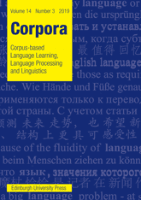
Corpora
Scope & Guideline
Innovating Linguistic Analysis for Tomorrow's Scholars
Introduction
Aims and Scopes
- Corpus Linguistics Methodologies:
The journal emphasizes the use of diverse methodologies in corpus linguistics, including statistical analysis, qualitative discourse analysis, and computational techniques to explore language patterns and structures. - Interdisciplinary Applications:
Research published in 'Corpora' often intersects with various fields, such as translation studies, education, sociolinguistics, and computational linguistics, illustrating the versatility of corpus analysis in addressing complex linguistic phenomena. - Language Learning and Teaching:
A significant portion of the journal's focus is on learner corpora and their implications for language acquisition, providing insights into language development and educational strategies. - Cultural and Ideological Analysis:
The journal includes studies that analyze language use in social contexts, exploring how ideologies and cultural narratives are constructed and represented through language. - Development of New Corpora:
'Corpora' also highlights the creation and utilization of new corpora for specific languages or contexts, facilitating further research and expanding the resources available for corpus analysis.
Trending and Emerging
- Integration of Technology and NLP:
There is a growing trend towards incorporating natural language processing (NLP) techniques into corpus linguistics, allowing for more sophisticated analyses of large datasets and enabling researchers to uncover intricate language patterns. - Multimodal and Cross-Linguistic Studies:
Emerging themes include the analysis of multimodal corpora and cross-linguistic comparisons, reflecting an interest in understanding language in diverse contexts and formats, such as visual and textual interactions. - Focus on Social Issues and Ideologies:
Recent studies increasingly address social issues, such as migration, gender representation, and identity, using corpus methods to analyze language's role in shaping societal narratives and ideologies. - Development of Learner Corpora:
There is a notable rise in research focusing on learner corpora, emphasizing the importance of understanding language acquisition processes and the implications for teaching practices. - Interdisciplinary Collaborations:
The trend of interdisciplinary collaborations is gaining momentum, with researchers from various fields, such as psychology, sociology, and education, contributing to corpus-based studies that enrich the understanding of language in social contexts.
Declining or Waning
- Traditional Corpus Studies:
Research that focuses solely on traditional corpus studies without integrating modern computational techniques or interdisciplinary approaches appears to be declining, as the field moves towards more innovative and hybrid methodologies. - Narrowly Defined Linguistic Features:
The exploration of narrowly defined linguistic features, such as specific grammatical constructions without broader contextual analysis, is becoming less frequent, indicating a trend towards more holistic and contextually rich investigations. - Static Corpora Analysis:
Studies centered around static corpora, with limited engagement in dynamic language change or real-time data analysis, are decreasing, reflecting a shift towards more interactive and adaptable research approaches.
Similar Journals
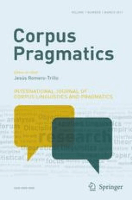
Corpus Pragmatics
Bridging Language and Technology for Tomorrow's InsightsCorpus Pragmatics is an esteemed academic journal published by SpringerNature, focusing on the interdisciplinary field of linguistics and its applications within the realms of computer science and social sciences. With a strong foundation since its inception in 2017, the journal has made significant strides, earning recognition with a Q2 rating in Linguistics and Language and a Q3 in Computer Science Applications as of 2023. The journal's impressive Scopus rankings highlight its impact, placing it in the 86th percentile among language and linguistics journals. Corpus Pragmatics aims to bridge the gap between empirical research and theoretical insights, fostering an environment that promotes innovative approaches to understanding the complexities of language use in a digital age. As an open-access platform, it provides researchers, professionals, and students with invaluable resources to enhance their work and engage with the latest findings in the field. With a commitment to quality and relevance, Corpus Pragmatics stands out as a vital resource for advancing knowledge in linguistics and its computational applications, making significant contributions to both academia and industry.

Linguistica e Filologia
Advancing Linguistic Scholarship, Bridging Cultures.Linguistica e Filologia is a prominent academic journal published by UNIV DEGLI STUDI BERGAMO that offers an Open Access platform since 2002, fostering scholarly communication in the fields of linguistics, philology, and comparative literature. With a commitment to advancing understanding in these disciplines, the journal serves as a vital resource for researchers, professionals, and students alike. Its content encompasses diverse theoretical and empirical studies, critiques, and analyses of language and literature, encouraging interdisciplinary dialogue. Hosted in the picturesque city of Bergamo, Italy, the journal aims to bridge gaps between historical and contemporary linguistic practices, enhancing the global discourse on language studies. With a focus on quality, transparency, and accessibility, Linguistica e Filologia plays a crucial role in shaping the future of linguistic scholarship and is an invaluable reference for anyone interested in the intricate relationships between language and culture.

RUSSIAN LINGUISTICS
Fostering dialogue in the realm of language and culture.RUSSIAN LINGUISTICS is a peer-reviewed academic journal published by Springer, dedicated to advancing the understanding of the Russian language and its interplay with various linguistic frameworks. With a longstanding history that spans from its inception in 1974, the journal encompasses a broad range of topics within the fields of linguistics and language studies, offering valuable insights especially in *Developmental and Educational Psychology* and the intricacies of linguistics at large. Currently ranked in the Q2 quartile for Linguistics and Language, and holding substantial positions within Scopus rankings, RUSSIAN LINGUISTICS serves as an essential resource for researchers, educators, and students alike, fostering dialogue and collaboration within the international linguistic community. The journal notably provides critical access to research findings that enhance the comprehension of Russian linguistics' role in a global context, despite operating under a traditional access model. For those pursuing scholarly excellence, RUSSIAN LINGUISTICS remains a pivotal platform for disseminating innovative research and promoting the study of language.
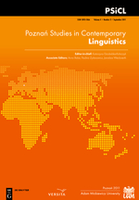
Poznan Studies in Contemporary Linguistics
Cultivating knowledge in the evolving field of linguistics.Poznan Studies in Contemporary Linguistics, published by DE GRUYTER MOUTON, is a pivotal journal in the field of linguistics, with an ISSN of 0137-2459 and an E-ISSN of 1897-7499. Located in Germany, this esteemed journal has consistently contributed to the academic landscape since its inception. As of 2023, it holds a Q2 category rank in Linguistics and Language and boasts commendable Scopus rankings, featuring in the 69th percentile for Arts and Humanities and the 66th percentile for Social Sciences. The journal emerges as a vital platform for scholars to explore contemporary linguistic theories and practices, making it an essential resource for researchers, professionals, and students alike. With a converged publication period from 2007 to 2024, it aims to facilitate a deeper understanding of linguistic advancements and trends. While the journal currently does not offer open access, its rigorous peer-review process ensures the highest quality of published research, strengthening its role as a leading discourse in the dynamic field of linguistics.
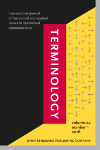
Terminology
Empowering Scholars with Insightful Terminology DiscussionsTerminology is a highly regarded journal published by John Benjamins Publishing Co, focusing on the multidisciplinary fields of communication, library and information sciences, and linguistics. Since its inception, the journal has provided a platform for rigorous research and innovative discussions surrounding the theory and practice of terminology, shedding light on its significance in effective communication and knowledge organization. With its Q2 ranking in the 2023 quartiles for communication and linguistics, and an impressive 78th percentile ranking in language and linguistics according to Scopus, Terminology stands as an influential resource for scholars and practitioners alike. Although not an open access journal, it is committed to enhancing the visibility and dissemination of critical academic work. The journal's comprehensive scope includes empirical studies, critical reviews, and theoretical explorations from 1994 to 2024, making it a vital resource for researchers, professionals, and students seeking to advance their understanding of linguistic practices and terminological challenges in an increasingly interconnected world.
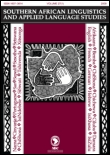
Southern African Linguistics and Applied Language Studies
Connecting Linguistics with Southern African ContextsSouthern African Linguistics and Applied Language Studies is a prestigious journal dedicated to the exploration and analysis of linguistics and applied language studies within the Southern African context. Published by Taylor & Francis Ltd, this esteemed journal has established itself as a significant platform for scholars and practitioners since its inception in 2003. With an impressive Q2 ranking in the Linguistics and Language category and a current Scopus rank of #430 out of 1167, it occupies a vital position in the academic landscape, appealing to a diverse readership keen on linguistic research, language policy, and applied linguistics. While the journal is not currently open access, it provides comprehensive insights and scholarly articles that foster understanding and innovation in linguistic practices and language education. As of 2024, the journal continues to deepen its impact through rigorous peer-review and a commitment to advancing knowledge, making it a key resource for researchers, educators, and students seeking to navigate the complexities of language within the Southern African region and beyond.
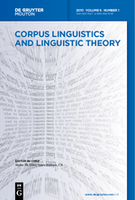
Corpus Linguistics and Linguistic Theory
Shaping the future of linguistics with data-driven research.Corpus Linguistics and Linguistic Theory, published by DE GRUYTER MOUTON, is a premier academic journal dedicated to advancing the interdisciplinary field of linguistics through the lens of corpus-based research methodologies. With an ISSN of 1613-7027 and E-ISSN 1613-7035, this journal is a valuable resource for linguists, researchers, and students who aim to investigate language structures, usage, and their theoretical implications. Recognized as a Q1 journal in the realm of Linguistics and Language, it boasts impressive Scopus rankings, positioning it within the top 7% and 8% of its categories in the Arts and Humanities and Social Sciences, respectively. Its relevance is underscored by a commitment to publishing rigorous research from 2005 to 2024, addressing contemporary advancements in linguistic theory fueled by empirical data. While the journal is not open access, it remains an essential platform for disseminating high-quality scholarship that informs both theoretical perspectives and practical applications in linguistics. As such, Corpus Linguistics and Linguistic Theory plays a crucial role in shaping the future of linguistic studies, making it indispensable for anyone engaged in this dynamic field.
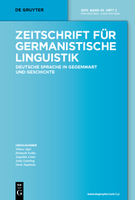
ZEITSCHRIFT FUR GERMANISTISCHE LINGUISTIK
Exploring the Depths of German LinguisticsZEITSCHRIFT FUR GERMANISTISCHE LINGUISTIK, published by WALTER DE GRUYTER GMBH, stands as a pivotal resource in the field of linguistics since its inception in 1973. With its ISSN 0301-3294 and E-ISSN 1613-0626, this esteemed journal serves as an essential platform for researchers and academics focused on the nuances of the German language and its linguistic frameworks. Catering to a diverse audience, the journal features high-impact articles and contributions consistent with rigorous academic standards, as evident from its Q1 categorization in Linguistics and Language and its notable rankings in both the Arts and Humanities and Social Sciences domains. The journal's commitment to advancing knowledge in linguistics fosters a scholarly environment conducive to both emerging and established linguists. While not available through open access, ZEITSCHRIFT FUR GERMANISTISCHE LINGUISTIK remains influential, drawing readers keen on exploring developmental and educational paradigms alongside linguistic theories. With a convergence of research that spans until 2024, it represents a comprehensive body of work integral to the evolving landscape of linguistic studies in Germany and beyond.

NEUPHILOLOGISCHE MITTEILUNGEN
Unraveling Linguistic Trends from a European PerspectiveNEUPHILOLOGISCHE MITTEILUNGEN, published by the esteemed Modern Language Society, stands as a significant contribution to the domain of Language and Linguistics. With a history dating back to 1971, this journal has consistently provided an academic platform for researchers and scholars, navigating through the intricacies of philology and linguistic studies. Although it is indexed in Scopus with rankings reflecting its position in the Arts and Humanities and Social Sciences categories, it currently does not offer Open Access, which may require interested parties to seek institutional access for its wealth of content. The journal has experienced periods of coverage discontinuation in recent years, yet it remains a valued source for advancing the understanding of language theories and linguistic practices. Its location in Helsinki, Finland, offers a unique European perspective on global linguistic issues. The journal is ideal for those looking to engage with evolving linguistic trends and contribute to contemporary discussions in the field.
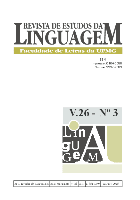
Revista de Estudos da Linguagem
Fostering Collaboration in Language StudiesRevista de Estudos da Linguagem, an esteemed academic journal published by the Universidade Federal de Minas Gerais within its Faculty of Letters, serves as a vital resource for scholars in the fields of linguistics and education. Since its inception in 1992, the journal has embraced an open access model, ensuring that research is accessible to a broader audience, thereby fostering collaboration and knowledge dissemination. Based in Brazil, this journal focuses on a wide array of topics related to language studies, contributing significantly to the discourse within the linguistics community. While recent rankings place it in Q4 in Education and Q3 in Linguistics and Language categories, its dedication to publishing high-quality research continues to attract attention despite its current Scopus rankings. The journal notably ranks at #668 in Language and Linguistics, verifying its emerging impact in the academic landscape. Researchers and students alike will find the journal's commitment to diversity in linguistic research a compelling reason to engage with its articles. The journal's offices are located at AV ANTONIO CARLOS, 6627 PAMPULHA, BELO HORIZONTE, MG, BRAZIL, and it continues to invite contributions that challenge established norms and explore innovative themes within the dynamic realm of language studies.